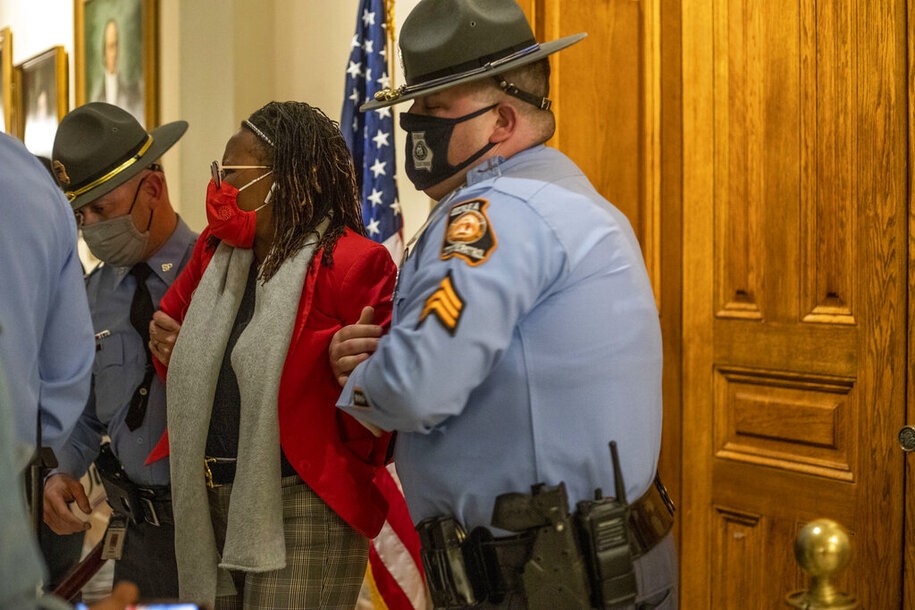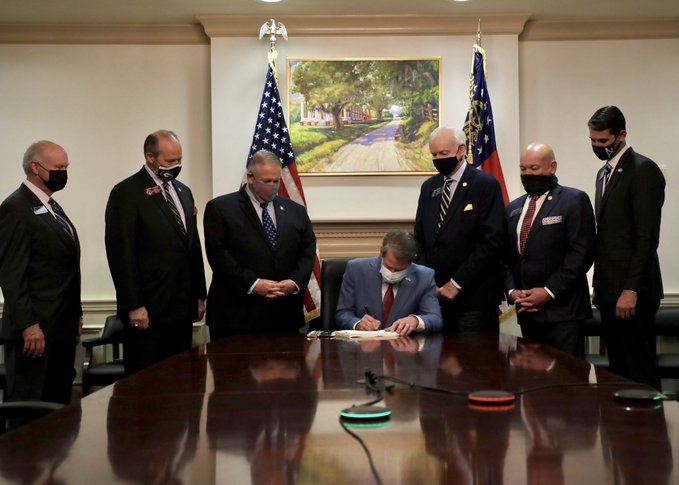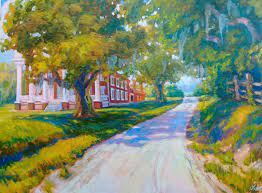
On Thursday, Georgia Gov. Brian Kemp signed a viciously anti-voter law that would, among other things, penalize people for simply handing out water or snacks to people waiting in hours-long lines. (Lines that are long by design.) In fact, the bill is so blatantly designed to suppress the vote in Georgia that it includes nearly 100 pages of new voter restrictions.
There is no question these restrictions are racist in nature, from the first to the last. As Nsé Ufot of The New Georgia Project told Kos and Kerry Eleveld on an episode of The Brief, this bill and others like them are a “whitelash” response to the success of Stacey Abrams, The New Georgia Project, Fair Fight, and the campaigns of Sens. Reverend Raphael Warnock and Jon Ossoff.
As bad as this bill is, there is another sinister element to this bill signing, which took place as six white men looked over the shoulder of Kemp. Philadephia Inquirer columnist Will Bunch noticed the painting behind Kemp and rattled off a Twitter thread about the historical significance of that painting and the plantation depicted in it. Buckle up, folks—this is going to be infuriating.

While Republican Gov. Brian Kemp was signing Georgia Republicans’ sweeping voter suppression bill into law, in a private ceremony behind closed doors and surrounded by white men, a Black legislator was being cuffed and dragged away by law enforcement because she knocked on that closed door. Rep. Park Cannon faces two felony charges for doing her job, representing her constituents whose vote Kemp and his fellow Republicans are determined to strip away.
Those felony charges are legally questionable, because the Georgia constitution says legislators are "free from arrest during sessions of the General Assembly," but that didn't stop the state troopers from arresting her or apparently authorities from charging her. Her offense was trying to throw some sunlight on what clearly Kemp wanted to keep hidden: His signing the blatant voter suppression into law while seated under a painting of Callaway Plantation, a notorious slave plantation. Because of course that's what all those white Republican men revere.
The law itself attacks voting rights in nearly every way possible. It requires registered absentee voters to submit a driver's license or other documentation to check their identity, replacing the signature—the one thing that every voter has—matching process. There are more than 200,000 Georgia voters who do not have a driver's license or state identification number. The deadline for absentee ballot requests is set 11 days before the election, so people experiencing an emergency or other situation in those 11 days that might prevent them from voting on Election Day are out of luck.
Early voting for runoff elections, like the one that sent two Democrats to the U.S. Senate, has been reduced from three weeks to as little as one week, and requires runoffs to be held four weeks after the general election, giving little time for early voting. The new law gives the State Election Board the unilateral power to remove county election boards and replace them with their own managers, and counties will have to provide election results in 6 days instead of 10. It forces election workers to count ballots all in one go, now allowing them to stop until all ballots are finished.
It also limits ballot drop box locations. Georgia Republicans have done everything in their power to force voters to stand in long lines on Election Day, and then to cap it all off, made it illegal for members of the public to give food or water to those voters standing in line.
President Joe Biden is right. "What I'm worried about is how un-American this whole initiative is," Biden said in his news conference Thursday. "It's sick."
Georgia Sen. Raphael Warnock, joined Cannon. He is her pastor at Ebenezer Baptist Church. "Today is a very sad day for the state of Georgia," he said. "What we have witnessed today is a desperate attempt to lock out and squeeze the people out of their own democracy."
Elections lawyer Marc Elias, the lead attorney who beat back the ridiculous flurry of law suits from Donald Trump and Republicans over November's election, has filed suit in federal district court, charging that the new law violates the U.S. Constitution and the Voting Rights Act. He filed that suit on behalf of the New Georgia Project, Black Voters Matter, and the student organization Rise.
This bill, Elias told MSNBC's Rachel Maddow, "shows the ingenuity of the Republican Party to find ever-new ways to attack voting and attack democracy. … [T]hese laws are all aimed at disenfranchising Black voters and also young voters," he said. "The role of the Courts are to protect fundamental rights when politicians fail them, and right now Republican politicians around the country are failing voters and failing democracy and we have to turn to the courts."
There's also Congress, where those Republicans aren't failing voters. They're blatantly helping suppress them. The For the People Act and the John Lewis Voting Rights Advancement Act have not yet come to the Senate floor, but Majority Leader Chuck Schumer is promising they will and soon. So in that sense, Georgia might just have done voting rights a favor. They've made the issue as crystal clear as it could be.










No comments:
Post a Comment